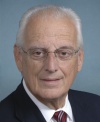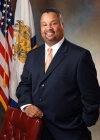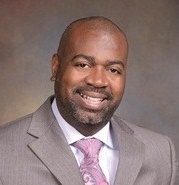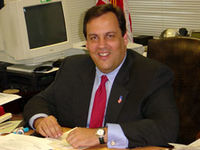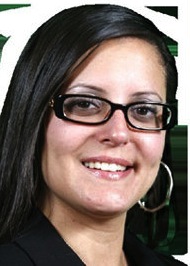Newark Public Schools elections (2016)
Presidential • U.S. House • State ballot measures • Local ballot measures • School boards • Municipal • Candidate ballot access |
2017 →
← 2015 |
|---|
|
|
| Enrollment (13–14): |
|
|
The Newark Unity slate of candidates swept the election for three seats on the Newark, New Jersey Newark Public Schools Board of Education in the at-large general election held on April 19, 2016. Candidates Leah Owens, Tave Padilla, and Deborah Kim Thompson-Gaddy won the three largest vote shares in the race. This was the sixth Newark Schools election cycle dominated by a slate of candidates endorsed by Mayor Ras J. Baraka. Following this election, all nine members of the board were Baraka-endorsed candidates and either members of the "Children First Team" or Newark Unity slate. The remaining nine candidates, Jason Dotson, Thomas Ellis, Carole Graves, Tamara Moore, Jody Pittman, Juan Silva, George Tillman, Jimmie White, and former candidate Sheila Montague, were unsuccessful in their election bids.[1]
The Newark Public Schools school board was taken over by the state of New Jersey in 1995. The school board has only held advisory status, limiting the power of sitting members. Following an agreement made in 2015 by Gov. Chris Christie (R) and Newark Mayor Ras Baraka, the school district began to transition back to local control after the April 2016 general election. To make this transition as smooth as possible, the two leaders created a nine-person panel charged with creating an overarching district plan. The Newark Board of Education hopes to regain full control within the next several years and a report outlining the full plan was expected in August 2016.[2][3]
- Learn more about issues facing the district in the What was at stake? section.
Elections
Voter and candidate information
The Newark Advisory Board consists of nine members elected at large to three-year terms. There was no primary election, and the general election was April 16, 2016.[4]
Candidates had to file by February 29, 2016, and they had until March 7, 2016, to withdraw from the race. The drawing of ballot positions was held March 9, 2016.[4]
In order to vote in the election, district residents had to register by March 29, 2016.[4]
Candidates and results
At-large
Results
| Newark Public Schools, At-Large General Election, 3-year terms, 2016 |
||
|---|---|---|
| Candidate | Vote % | Votes |
| 21.92% | 5,909 | |
| 21.86% | 5,892 | |
| 18.62% | 5,018 | |
| Sheila Montague | 9.56% | 2,576 |
| Carole Graves | 8.09% | 2,180 |
| Tamara Moore | 6.59% | 1,775 |
| Thomas Ellis | 3.32% | 896 |
| Jody Pittman | 2.95% | 794 |
| Juan Silva | 2.29% | 618 |
| George Tillman | 1.87% | 505 |
| Jimmie White | 1.68% | 452 |
| Jason Dotson | 1.25% | 338 |
| Total Votes | 26,953 | |
| Source: Essex County Clerk, "2016 School Board Election," accessed May 10, 2016 | ||
Candidates
| Jason Dotson | Thomas Ellis | Carole Graves | Sheila Montague | Tamara Moore | Leah Owens |
|---|---|---|---|---|---|
|
|
|
|
| |
| Tave Padilla |
Jody Pittman | Juan Silva | George Tillman | Deborah Kim Thompson-Gaddy |
Jimmie White |
|
|
|
|
|
|
Additional elections on the ballot
There were no additional elections on the Newark Public Schools school board ballot in 2016.
Key deadlines
The following dates were key deadlines for New Jersey school board elections in 2016:[5]
| Deadline | Event |
|---|---|
| February 29, 2016 | Candidate filing deadline |
| March 29, 2016 | Last day for voter registration and transfer |
| April 19, 2016 | Pre-general election campaign finance deadline |
District map
Click on the image below to access a larger version of the map.
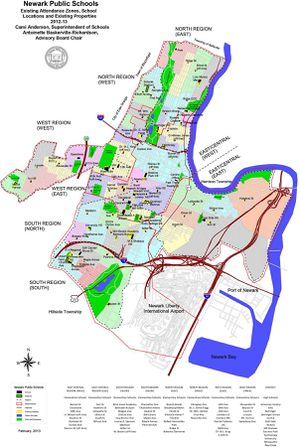
Endorsements
Jason Dotson and Sheila Montague were endorsed in the race by Transparency Matters.[6]
Carole Graves was endorsed in the race by the Newark Teachers Union.[7]
Leah Owens was endorsed in the race by New Jersey Communities United and Newark Unity Slate.[8][9]
Tave Padilla and was endorsed in the race by Newark Unity Slate.[9]
Deborah Kim Thompson-Gaddy was endorsed in the race by Newark Unity Slate and Newark Central Ward Councilwoman Gayle Chaneyfield Jenkins.[9][10]
Campaign finance
Candidates received a total of $39,833.50 and spent a total of $14,459.87 in the election, according to the New Jersey Election Law Enforcement Commission.[11]
Additionally, Newark Unity Slate reported $37,825.00 in contributions and $25,304.97 in expenditures on a joint candidate committee campaign finance form in the election. The three candidates named on the form were Deborah Kim Thompson-Gaddy, Leah Owens, and Tave Padilla.[11]
Past elections
Information about earlier elections can be found by clicking [show] at the right. | ||||||||||||||||||||||||||||||||||||||||||||||||||||||||||||||||||
|---|---|---|---|---|---|---|---|---|---|---|---|---|---|---|---|---|---|---|---|---|---|---|---|---|---|---|---|---|---|---|---|---|---|---|---|---|---|---|---|---|---|---|---|---|---|---|---|---|---|---|---|---|---|---|---|---|---|---|---|---|---|---|---|---|---|---|
2015
| ||||||||||||||||||||||||||||||||||||||||||||||||||||||||||||||||||
What was at stake?
2016
Issues in the election
Local control to return to school board
A 2015 agreement between Gov. Chris Christie (R), city Mayor Ras Baraka, and an appointed board planned to remove the "advisory status" of the Newark Board of Education and started a plan to return full local control to the district for the first time in two decades. A full report on this plan was expected in August 2016. The state originally took over the district in 1995.[12][13][14][15]
The agreement created the Newark Educational Success Board, a nine-member panel appointed jointly by Christie and Baraka. The panel focused on easing the board's transition from state-controlled to fully independent. Newark community members expressed concern that the lack of local control made the school board less responsive to citizen wishes. The panel sketched a future plan aimed at long-term district stability and a timeline for the full transition of power.[13]
Consequently, stakes were higher than ever for the April 19, 2016, election. The candidates who won joined the first board in 20 years to potentially have full control of the district. Additionally, incumbents Ariagna Perello, Rashon Hasan, and Khalil Sabu Rashidi did not file for re-election, guaranteeing three new voices on the board.[12]
Newark Unity slate
Newark Mayor Ras J. Baraka endorsed three candidates, Leah Owens, Tave Padilla, and Deborah Kim Thompson-Gaddy, in the race for the district's board. This coalition was called the Newark Unity slate of candidates. The slate aimed to reduce the disagreements often seen in local political races and was supported by numerous political actors, including charter school advocates. In 2016, Baraka clashed with education reformers over his desire to halt charter school expansion pending the full funding of state public schools.[9]
In response to questions regarding this unity, Baraka stated that, "at this time we need to overcome our differences, to work together, to unite to ensure that all of our children get the very best education. We must move beyond the fighting, ideological wars and turmoil." Each of the three candidates ran on his or her own platform and did not espouse a cohesive view of issues or politics in Newark Public Schools.[9]
Issues in the district
Gov. Christie proposes “Fairness Formula” plan
New Jersey Gov. Chris Christie (R) unveiled a new education funding plan for the state on June 21, 2016. He proposed a "Fairness Formula" that would equalize per-pupil funding statewide. Rather than continue funding districts at different levels, Christie called for a flat rate of $6,599 per pupil per school year to fix a system he called "broken." If the proposal were approved, Christie said 75 percent of towns would receive more state aid and see their property taxes decrease.[16][17]
The rate of $6,599 per pupil was calculated by dividing the $9.1 billion the state spent on education funding in 2016 by the number of students in kindergarten through 12th grade. Christie said a disproportionate amount of funding had gone to underperforming schools in the state, beginning in the 1980s.[17]
| Gov. Chris Christie (R) proposes a new education funding formula. |
| “ | No child in this state is worth more state aid than another. No family in this state should have to disproportionately pay — you’ve got a bigger house, you’re going to pay more in property taxes, you’ve got more land, you’re going to pay more in property taxes — that’s not what I’m talking about...We’re talking about 546 districts having to divide $88 billion over the last 30 years and 31 districts dividing $97 billion. Where did the money go? And what did you get in return for it? But an even more important question than what did you get in return for it — what did those children and their families get in return for it?[18] | ” |
| —Gov. Chris Christie (June 21, 2016)[17] | ||
The New Jersey Education Association (NJEA) called Christie's funding proposal “despicable” and said it would "set the state’s progress in education back decades," according to the Newark Patch.[16] NJEA President Wendell Steinhauer also called the plan a distraction from Christie's record on education policy. “Having never once funded the state’s existing formula, he has no basis for assessing its effectiveness," said Steinhauer.[17]
The proposal entailed up to a 1,714 percent increase in state aid, in the case of North Caldwell Public Schools, or as much as a 78 percent decrease, in the case of the Camden City School District, according to a study by NJ.com.[19]
In 2016, Jersey City Public Schools received approximately three-quarters of its funding from the state and had a per-pupil funding rate of $15,235.[20] Christie's proposal entailed that the funding rate for the district would drop by roughly $8,600 per student—an almost 57 percent decrease from the 2016 funding levels. The Jersey City Schools Board of Education had three seats up for general election in November 2016. All of the candidates expressed disdain for Christie's funding plan, though Jersey City Mayor Steve Fulop (D) and district superintendent Marcia Lyles declined to comment on either proposal.[20]
“By sending equal dollar amounts per pupil to each district, regardless of need, his plan would subsidize those who have the most at the expense of those who have the least. That is the opposite of fair; it’s despicable,” said Steinhauer.[17] Christie's administration said that money was not the solution to education. “More money does not guarantee better academic performance, and the Christie Administration is determined to forge a new path that provides equal funding for the education of each student,” said a spokesman for the governor's office.[17]
Lead found in district's water supply
Elevated lead levels were detected in almost half the schools in the Newark district, authorities announced on March 10, 2016. Water fountains at 30 schools were shut off and other water sources were brought in for use.[21] Out of approximately 300 samples taken at 30 school buildings, 59 had levels of lead above the federal government’s standard which requires further action, testing included.
On March 17, 2016, the district began voluntary blood tests to check students for the presence of lead.[22] According to NBC New York, up to 17,000 children were set to be tested for lead poisoning, and the district planned to test every tap at each school in consultation with the Environmental Protection Agency.[22]
On March 23, 2016, U.S. Reps. Bill Pascrell, Jr. (D) and Donald Payne, Jr. (D) introduced a legislative proposal to "create a $100 million grant program for schools and childcare centers that want to test their water."[23]
The federal legislation was written to require that funding be made available to states for school districts and charter schools to test their water for lead. Any schools participating would then be required to test their water either once or twice yearly, depending on the age of the building. This push for federal funding came at the same time as Sen. Stephen Sweeney (D-Gloucester), Sen. Ron Rice (D-Essex), and Sen. Teresa Ruiz (D-Essex) called for the drinking water in every New Jersey school to be tested. The senators introduced a bill in mid-March to require testing at every school and "remediation treatment, if necessary."[24] The bill was written to allow $3 million to be used in order to perform these tests.
Newark Public Schools changes employee prescription benefit plan
Newark Public Schools planned to change the prescription benefits provided to its employees for the first time in 20 years. In light of the district's "large projected budget gap," workers with the Newark Teachers Union (NTU) began to be transitioned to the new benefits provider, Benecard, on April 1, 2016. All other district employees had already switched to Benecard in February. According to school administrators, the change was estimated to save the district at least $1.1 million a year.
The NTU had "questioned the district’s authority to change benefits plans for employees without the approval of a joint entity - the Supplemental Fringe Benefits Fund - that was established more than 30 years ago."[25] But the New Jersey Superior Court ruled that the district could move all NTU employees to the new benefits provider on March 16, 2016. "The district has our employees’ best interest in mind, and I am committed to working with the Newark Teachers Union and our employees to ensure this new benefits program works for everyone," said Newark Public Schools Superintendent Christopher Cerf. "I hope that the Superior Court’s ruling brings the Newark Teachers Union to the negotiating table, rather than the courtroom."[25] The NTU posted the following response on their website:
| “ | After serving as the prescription benefits provider for the Supplemental Fringe Benefits Fund for over 20 years, General Prescriptions Program has terminated its contract with the SFB. As a result of GPP’s termination, BeneCard, will be installed in its place effective April 1. Notwithstanding GPP’s termination, we are continuing with our pending legal and grievance actions against the Newark Public Schools for their unilateral and improper selection of BeneCard and will keep you posted. | ” |
| —Newark Teachers Union[26] | ||
2015
From 2011 to 2014, Newark's Advisory Board elections garnered an average of 2.92 candidates per seat up for election. With eight candidates running for the three seats up for election, 2015's ballot was slightly below that average at 2.67 candidates per seat up for election.
Issues in the election
Children First Team majority to stay
| 2014-2015 Newark Advisory Board & Children First Team candidacy[27] | |||
|---|---|---|---|
| Member | Term Ends | CFT ? | |
| Antoinette Baskerville-Richardson | 2017 | Yes | |
| Marques-Aquil Lewis | 2015 | Yes | |
| Rashon K. Hasan | 2016 | Yes | |
| Donald G. Jackson Jr. | 2017 | No | |
| DeNiqua Matias | 2015 | Yes | |
| Rashied McCreary | 2015 | No | |
| Ariagna Perello | 2016 | Yes | |
| Khalil Sabu Rashidi | 2016 | Yes | |
| Philip Seelinger | 2017 | Yes | |
Over the four election cycles leading up to the 2015 election, the Children First Team (CFT) accumulated a seven-member majority on the nine-member Advisory Board. The team, organized by Ras J. Baraka, first became a part of the Advisory Board elections in 2011. Baraka was then the South Ward representative on the Newark City Council. He served on the council from 2010 until 2014, when he was elected Mayor of Newark. Baraka backed three candidates for the Advisory Board each year. From 2011 to 2014, the CFT won at least two seats in each election.
With eight candidates seeking the three seats up for election in 2015, the CFT could have increased or decreased in its majority power. Even if all three seats had been won by non-CFT candidates, the group was guaranteed at least a six-member majority following the 2015 election.
In 2011, Alturrick Kenney and Antoinette Baskerville-Richardson were the first CFT candidates to join the board. Two more seats were secured by the Baraka-backed group in 2012, when Marques-Aquil Lewis and DeNiqua Matia won in that general election. In 2013, the entire CFT slate, Khalil Sabu Rashidi, Ariagna Perello, and Rashon K. Hasan, won election to the board. Antoinette Baskerville-Richardson retained her seat and Philip Seelinger secured another for the CFT team in the 2014 election.
In 2015, two seats held by CFT members were up for election. While Marques-Aquil Lewis sought re-election on the slate, the other CFT member, DeNiqua Matias, did not run. The other incumbent up for re-election, Rashied McCreary, did not file to run for re-election. He was one of just two non-CFT members on the board prior to the 2015 election.
Spring New Jersey school board elections increasingly rare
Only 18 New Jersey school districts, including Newark Public Schools, held school board and budget approval elections in April instead of November in 2015.[28] In 2012, Gov. Chris Christie (R) signed a law removing the voter approval requirement for school districts' proposed budgets unless they exceeded a mandatory 2 percent property tax cap. Additionally, the law allowed school districts to move their elections from the spring election date to the fall general election date.[29]
A significant number of districts signed on to the changes in order to avoid the costs of holding additional elections; as of the April 2012 elections, 87 percent of districts had chosen to adopt the changes. Nevertheless, some districts chose to wait due to a requirement that those who moved their election to November had to stick with that choice for at least four years before changing back. Other districts stated they would keep budget approval voting to respect their residents' role in the decision-making process.[29] Due to Newark's district being state operated, no budget election was held in 2015.[28]
Issues in the district
State control & superintendent controversies continue
Over two decades of state control of the district and tensions with state-appointed Superintendent Cami Anderson continued to foster resistance from community members and local politicians leading up to the 2015 election. The February 2015 announcement that the state would be renewing Anderson's contract highlighted anew the ongoing turmoil in the district.[30]
Background: State control and One Newark
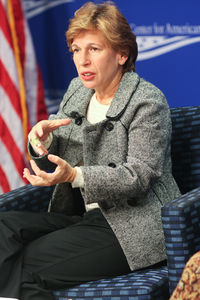
Since 1995, the state government has controlled Newark Public Schools. In 2013, the Newark Students Union led two mass boycotts against state control of the district in April and November, with the April walkout reportedly drawing about 1,000 students.[31][32] Superintendent Cami Anderson, who was nominated by Gov. Chris Christie (R) and appointed by the State Board of Education in 2011, had put forward a controversial district reform plan labeled One Newark that included school closures, teacher layoffs, Teach for America hirings and changes to the district's enrollment system for both traditional and charter schools.[33]
American Federation of Teachers President Randi Weingarten sent a letter to Gov. Christie criticizing Anderson's plan to use teacher performance evaluations instead of seniority in deciding which teachers to lay off. She concluded the letter by arguing that the state should relinquish control of the school district.[34][35] Community protests of the plan were held in Trenton, as well as student protests that included walkouts from school.[36][37]
Legislative critiques
Anderson moved forward with One Newark despite the resistance, and faced a steady stream of criticism into 2015 regarding the plan and its effectiveness. In January 2015, Anderson appeared before the Joint Committee on Public Schools to explain the intentions and progress of the program since it was first discussed. Members of the committee were highly critical of Anderson and the program, emphasizing the alienation residents of the district have felt and a lack of transparency in the plan's implemenation.[38]
Assemblywoman Eliana Pintor Marin (D-29), a former Newark Advisory Board member, questioned Anderson's school board meeting attendance record. Anderson stated that she could not remember when she last attended a meeting and that it had been "quite some time," but added, "I listen to people who disagree with me. It’s part of my job.” Pintor Marin responded, “It is part of your job to attend board meetings. That’s the main problem. There is no sell factor for the Newark Public Schools [about the One Newark plan] when you don’t attend.”[38]
Not long after this heated hearing, Gov. Christie announced the renewal of Anderson's contract for another year, which Anderson accepted, saying, "I am proud of the progress that my administration has made over the past three years in increasing graduation rates, teacher and administrator quality and school choice, but know that there is more work to be done on behalf of our students in the year ahead." The contract set Anderson's compensation at $255,000, which included a 1.6 percent cost-of-living raise.[30]
On March 10, 2015, a second joint committee hearing was held to hear testimony from New Jersey Education Association President Wendell Steinhauer, City Association of School Administrators (CASA) Executive Director Leonard Pugliese, and Mark Weber, a public teacher and doctoral student in education theory, organization and policy at the Rutgers University Graduate School of Education. Steinhauser called the renewal of Anderson's contract an "insult to every parent, students and teacher in Newark who has seen the destruction she’s caused." Weber, who had previously presented his research on the plan to the legislature in 2014, stated at this hearing that it had, "not only failed to improve student achievement in Newark; they have had a racially disparate impact on the [Newark Public Schools" [sic] certificated teaching and support staff."[39]
Pugliese's testimony drew particular interest as he pointed out that the New Jersey School Performance Reports done by the state Department of Education showed most Newark schools as having 100 percent attendance rates. He questioned the accuracy of these reports, as the same schools had been shown as having 30 to 40 percent absentee rates before the state assumed control of the district. Attendance rates are part of the state's measurement of whether or not One Newark is succeeding in preparing students for college and careers. Reducing absentee rates is also part of Anderson's contractual performance goals. Pugliese said of the dramatic decrease reported in the performance scores, "This is outrageous–and impossible. What’s equally outrageous is that the state department of education would post this document. Someone had to compile this data. Someone had to produce this graph." These accusations led some committee members to suggest that the legislature should subpoena state documents to verify the validity of the reports.[39]
Ballotpedia survey responses
One candidate out of the total twelve candidates in this race participated in Ballotpedia's 2016 survey of school board candidates. The following sections display the responses to the survey questions from Leah Owens.
Top priorities
When asked what she hoped to achieve if elected, Owens stated:
| “ | If elected to school board, I hope to galvanize the community to regain local control and secure full funding for the Newark Public Schools District.[18] | ” |
| —Leah Owens[40] | ||
Ranking the issues
The candidates were asked to rank the following issues by importance in the school district, with 1 being the most important and 7 being the least important. The following are the candidates' rankings:
- 1=Balancing or maintaining the district's budget
- 2=Improving education for special needs students
- 3=Expanding arts education
- 4=Improving post-secondary readiness
- 5=Improving relations with teachers
- 6=Closing the achievement gap
- 7=Expanding school choice options
Candidate survey
|
Ballotpedia invites school board candidates to participate in its annual survey. |
About the district
- See also: Newark Public Schools, New Jersey
Newark Public Schools is located in Essex County in northeastern New Jersey. The county seat is Newark. Essex County was home to approximately 795,723 residents in 2014, according to the United States Census Bureau.[41] The district was the largest school district in the state in the 2013–2014 school year and served 34,976 students.[42]
Demographics
Essex County underperformed in comparison to New Jersey as a whole in terms of higher education achievement, median household income, and poverty rate in 2014. The United States Census Bureau found that 32.3 percent of Essex County residents aged 25 years and older had attained a bachelor's degree, compared to 36.4 percent for New Jersey as a whole. The median household income in the county was $54,499, compared to $72,062 statewide. The poverty rate in Essex County was 16.7 percent, compared to 11.1 percent for the entire state.[41]
|
| |||||||||||||||||||||||||||||||||||||||||||||
Note: Percentages for race and ethnicity may add up to more than 100 percent because respondents may report more than one race and the Hispanic/Latino ethnicity may be selected in conjunction with any race. Read more about race and ethnicity in the census here.
Recent news
The link below is to the most recent stories in a Google news search for the terms 'Newark Public Schools' 'New Jersey'. These results are automatically generated from Google. Ballotpedia does not curate or endorse these articles.
See also
| Newark Public Schools | New Jersey | School Boards |
|---|---|---|
External links
Footnotes
- ↑ Mandy Gillip, "Email communication with Martha Jones, Newark district secretary to the superintendent," March 9, 2016
- ↑ NJ.com, "Christie and Baraka on schools: New board will pave way to local control," June 26, 2015
- ↑ New Jersey, "Christie and Baraka on schools: New board will pave way to local control," June 26, 2016
- ↑ 4.0 4.1 4.2 New Jersey School Boards Association, "Important April Election School District Dates 2015-2016," accessed March 10, 2016
- ↑ Essex County Clerk, "2016 Important Election Dates," accessed April 8, 2016
- ↑ Newark Trust for Education, "Jason Dotson," April 1, 2016
- ↑ Facebook, "Newark Teachers Union," accessed April 8, 2016
- ↑ New Jersey Communities United, " NJ Communities United Statement Regarding Newark School Board Elections," accessed April 8, 2016
- ↑ 9.0 9.1 9.2 9.3 9.4 Newark Unity Slate, "Newark Unity Slate Candidates," accessed April 8, 2016 Cite error: Invalid
<ref>tag; name "slate" defined multiple times with different content - ↑ Newark Inc., "Central Ward Councilwoman Throws Support Behind Gaddy in School Board Election," April 14, 2016
- ↑ 11.0 11.1 New Jersey Election Law Enforcement Commission, "Select Candidate or Committee," accessed June 24, 2016
- ↑ 12.0 12.1 nj.com, "At forum, Newark school board candidates take aim at state control," accessed March 29, 2016
- ↑ 13.0 13.1 nj.com, "Christie and Baraka on schools: New board will pave way to local control," accessed March 29, 2016
- ↑ nj.com, "Questions remain as new chapter in Newark schools begin," accessed March 29, 2016
- ↑ New Jersey, "Christie and Baraka on schools: New board will pave way to local control," June 26, 2016
- ↑ 16.0 16.1 Neward Patch, "Newark Students May Pay For Property Tax Cuts In Wealthy Essex County Towns," June 24, 2016
- ↑ 17.0 17.1 17.2 17.3 17.4 17.5 Morristown Patch, "Christie Unveils New School Funding Plan; NJEA Calls It 'Despicable'," June 21, 2016
- ↑ 18.0 18.1 18.2 Note: This text is quoted verbatim from the original source. Any inconsistencies are attributable to the original source.
- ↑ NJ.com, "How Christie's school aid proposal could impact your district," June 22, 2016
- ↑ 20.0 20.1 New Jersey, "Jersey City schools face threat of changes in state funding," September 8, 2016
- ↑ Fortune, "Lead Was Found in the Water of New Jersey's Biggest School System," accessed March 29, 2016
- ↑ 22.0 22.1 NBC New York, "Voluntary Lead Testing Begins At Newark Public Schools," accessed March 29, 2016
- ↑ nj.com, "N.J. congressmen want federal funds to test school water," accessed April 5, 2016
- ↑ nj.com, "Test water at every school for lead, N.J. lawmakers say," accessed April 5, 2016
- ↑ 25.0 25.1 Newark Patch, "Newark Schools Change Prescription Benefit Plan For Employees: 1st Time In 20 Years," accessed April 5, 2016
- ↑ Newark Teachers Union, "Prescription Update - March 18, 2016," accessed April 5, 2016
- ↑ Newark Public Schools, "Advisory Board," accessed March 7, 2014
- ↑ 28.0 28.1 NJ.com, "Few N.J. school districts still hold elections, budget votes in April," March 4, 2015
- ↑ 29.0 29.1 NJ.com, "School budget voting approaches for N.J. districts that opted out of new education law," April 16, 2012
- ↑ 30.0 30.1 NJ.com, "State renews contract of embattled Newark schools superintendent Cami Anderson," February 27, 2015
- ↑ Al Jazeera, "Newark students walkout over cut backs," April 10, 2013
- ↑ Teacher Under Construction, "Newark Students Organize Boycott, Demand Local Control of Schools," November 1, 2013
- ↑ The Washington Post, "Gov. Christie’s new crisis: Protests grow over state control of Newark schools," February 27, 2014
- ↑ American Federation of Teachers, "Letter from Randi Weingarten to New Jersey Gov. Chris Christie on the school crisis in Newark," February 26, 2014
- ↑ The Star-Ledger, "Newark schools chief warns of massive teacher layoffs; wants pink slips tied to performance," February 25, 2014
- ↑ Politicker NJ, "Crowd calls for Cami Anderson's removal as Newark school super at Statehouse rally," March 27, 2014
- ↑ Politicker NJ, "Newark student protest calls for return of local control," April 3, 2014
- ↑ 38.0 38.1 Politicker NJ, "Anderson, One Newark plan grilled by state committee on public schools," January 6, 2015
- ↑ 39.0 39.1 Politicker NJ, "Questions over One Newark plan, NJ School Performance Reports arise at committee hearing," March 10, 2015
- ↑ [Ballotpedia's school board candidate survey|Ballotpedia's school board candidate survey, 2016]],Leah Owen's responses, April 18, 2016
- ↑ 41.0 41.1 41.2 United States Census Bureau, "Essex County, New Jersey," accessed March 10, 2016
- ↑ National Center for Education Statistics, "ELSI Table Generator," accessed November 16, 2015
- ↑ New Jersey Department of State, "NJ Election Information and Results Archive," accessed January 20, 2014
| 2016 Newark Public Schools Elections | |
| Essex County, New Jersey | |
| Election date: | April 19, 2016 |
| Candidates: | At-large: Jason Dotson • Thomas Ellis • Carole Graves • Sheila Montague • Tamara Moore • Leah Owens • Tave Padilla • Jody Pittman • Juan Silva • George Tillman • Deborah Kim Thompson-Gaddy • Jimmie White |
| Important information: | What was at stake? • Key deadlines • Additional elections on the ballot |








